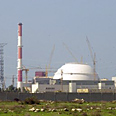
Coming a day after UN inspectors arrived to discuss access to more atomic sites, Abdolreza Rahmani-Fazli's comments were believed to be the first in which Iran explicitly linked pledges of more openness to hopes of forestalling further penalties.
Iran has already been hit by two sets of UN sanctions for not halting uranium enrichment, a process to make fuel for power stations that the United States and other Western countries fear Tehran wants to use to develop atom bombs.
"Naturally we expect that in return for Iran's vast cooperation with the agency ... some proper actions will be taken in order to create mutual trust," Rahmani-Fazli told the official IRNA news agency.
"These actions can include the prevention of another (UN sanctions) resolution."
Meanwhile a European diplomat partially attributed Iran's actions to Moscow's warning to Tehran that it will not deliver fuel to a nearly completed Russian-built nuclear reactor unless the country shows more openness.
Separately, a US official said Russia is not meeting other commitments that would allow the Iranians to activate the Bushehr nuclear reactor and also suggested the delays were an attempt to pressure Tehran into showing more compliance with UN demands.
The UN team was due to discuss an action plan giving the Vienna-based International Atomic Energy Agency (IAEA) more access to Iran's nuclear facilities.
On Tuesday, Iranian President Mahmoud Ahmadinejad reiterated his country would continue its nuclear work, which Tehran says is solely aimed at generating electricity so that it can export more oil and gas.
"The Iranian people will continue efforts to acquire nuclear energy for peaceful purposes," Algerian official APS news agency quoted him as saying during a visit to the North African state.
Iranian authorities have launched a drive to defuse Western suspicions about its nuclear program, seeking to ward off any stiffer action against it.
Analysts and diplomats say the existing UN sanctions, which have led to the freezing of foreign assets of dozens of Iranian individuals and entities like banks and companies, are starting to hurt the resource-rich economy.
New sanctions could harm "Iran's cooperation with the agency and make the atmosphere harsh," Rahmani-Fazli said.
Iran would not accept any proposal that included the idea of suspension of nuclear activities, he said, but he also appeared not to rule out the idea of Iran ceasing to expand its nuclear program if major powers did not push for more sanctions.
"If they (the West) mean that we continue our (nuclear) activities to some extent and at the same time negotiate with them, that is a different issue," he said.
The United States, leading international efforts to isolate Tehran, insists it must halt uranium enrichment before broader talks on financial, trade and other incentives take place.
But diplomats say Western powers have shelved plans to toughen sanctions against Iran until September, in the hope that its cooperation with the IAEA will improve.















